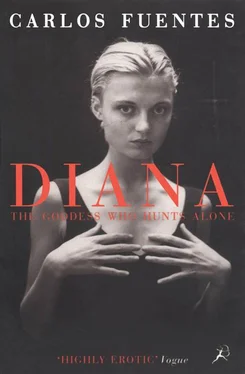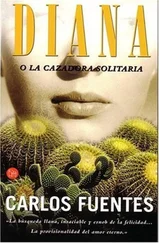Carlos Fuentes - Diana the Goddess Who Hunts Alone
Здесь есть возможность читать онлайн «Carlos Fuentes - Diana the Goddess Who Hunts Alone» весь текст электронной книги совершенно бесплатно (целиком полную версию без сокращений). В некоторых случаях можно слушать аудио, скачать через торрент в формате fb2 и присутствует краткое содержание. Год выпуска: 2012, Издательство: Bloomsbury UK, Жанр: Современная проза, на английском языке. Описание произведения, (предисловие) а так же отзывы посетителей доступны на портале библиотеки ЛибКат.
- Название:Diana the Goddess Who Hunts Alone
- Автор:
- Издательство:Bloomsbury UK
- Жанр:
- Год:2012
- ISBN:нет данных
- Рейтинг книги:3 / 5. Голосов: 1
-
Избранное:Добавить в избранное
- Отзывы:
-
Ваша оценка:
- 60
- 1
- 2
- 3
- 4
- 5
Diana the Goddess Who Hunts Alone: краткое содержание, описание и аннотация
Предлагаем к чтению аннотацию, описание, краткое содержание или предисловие (зависит от того, что написал сам автор книги «Diana the Goddess Who Hunts Alone»). Если вы не нашли необходимую информацию о книге — напишите в комментариях, мы постараемся отыскать её.
Diana the Goddess Who Hunts Alone — читать онлайн бесплатно полную книгу (весь текст) целиком
Ниже представлен текст книги, разбитый по страницам. Система сохранения места последней прочитанной страницы, позволяет с удобством читать онлайн бесплатно книгу «Diana the Goddess Who Hunts Alone», без необходимости каждый раз заново искать на чём Вы остановились. Поставьте закладку, и сможете в любой момент перейти на страницу, на которой закончили чтение.
Интервал:
Закладка:
“No. You can’t.”
“Do you ever go back to your hometown?”
“Sure. That’s why I know you can’t go back.”
“I don’t understand.”
“It’s a farce. I have to pretend I love them.”
She lifted her head. She looked at my inquisitive face and quickly said, as if to rid herself of it for good, “My parents. My friends from school. My boyfriends. I hate their guts.”
“Because they stayed there, in the rut?”
“Yes. But also because they saved themselves there. They didn’t have to act out roles the way I do. Maybe I hate them because I’m jealous of them.”
“You’re an actress. What’s so strange …”
“Iowa, Iowa.” She laughed with a touch of desperation. “I don’t know if we Americans should all go into exile as Baldwin and I did or stay at home as my parents and boyfriends did. Maybe our mistake, the mistake of the United States, is to go out into the world. We never understand anything going on outside the front door. We’re a bunch of payos, as you say, hicks. Hollywood! Just imagine: if you don’t know the most recent gossip, who’s sleeping with who, what everyone’s salary is, they think you’re a moron, an illiterate. All their jokes are about provincial, local subjects. Inside jokes, you know? They don’t understand someone like me, who never gives them the pleasure of repeating gossip or even of telling them about my love life.”
“Baldwin also says that Europe has what you Americans need — a sense of tragedy, of limits. On the other hand, you do have what the Europeans lack — a sense of life’s unlimited possibilities … An energy that…”
“I like it. I like that. What you just said.”
Diana’s burning hand in mine when the party ended and only she, Terrazas, and I were left. Diana invited us to have a nightcap in her hotel suite, and Eduardo said he’d drop us off while he went to pick up a girlfriend at Anderson’s on Paseo de la Reforma. He’d catch up with us at the Hilton, which wasn’t far away.
He never showed up. Diana and I had fun writing joint telegrams to all our friends in Paris. We went on talking about Hollywood (she), Mexico (I), drinking champagne and beginning to play with each other, while I swore that I’d never love her, that love’s space was too vast for me to sacrifice it to love, that on that very night I could have substituted other women for her, lots of other women, that loving her, nevertheless, was an exciting temptation, and that I never wanted to wonder later if I could deprive myself of her… That night, yes, I could have left her, invented any damn pretext and walked out of that suite, which looked like an M-G-M set in a hotel destined to collapse in the next earthquake.
While she undressed, I looked out the bedroom window at the statue of the Aztec king Cuauhtémoc holding his spear on high, standing guard over the pleasures of the city he’d lost.
VI
That long, marvelous first day of January 1970 in the Hilton suite, we didn’t bother to get dressed, just wrapped ourselves in towels whenever the room-service people came. We discovered a thousand details that linked us: we were both born in November — Scorpios can sense each other. At first, I called her a gamine, but she didn’t like it, so I stopped. But we both liked another French word, désolé, desolate, I’m so sorry, and we said it all the time, désolé about this, désolé about that, especially when we asked each other for physical love: we pronounced ourselves désolés, I’m so sorry, but I would like to kiss you, I’m sorrier, but you could come closer … desolate, the two of us.
Close to her. Whenever I was, everything else faded into the background, vanished like the night itself as the first light of the new year broke over the intersection of Reforma and Insurgentes. My lovely, sinister city, center of all beauty and all horror, México, D.F. All too frequently, the only thing that would bring people together in my city was solitude, a craving for company, a group, the need to belong. Even sex in Mexico City, once you’re above a certain income bracket (everything here is determined by brutal class differences), is like going down a slide, riding a toboggan of pleasures — uncertain, partial, immediate — that are never postponed and end only with death. Then, when we die, we realize we were always dead.
Not Diana. She infuriated Beverly Hills gossips because they never knew whom she was sleeping with — in a city where every woman announced such things publicly. What she was doing now, it was clear to me, was an act of total commitment, one she desired, not an accident but at the same time, I sensed without knowing why, dangerous. I told myself, as afternoon came on and I remembered the pleasure of making love with Diana, that we had no illusions about each other, neither of us. Our relationship was a passing one. She was here to make a film, I was the lucky boy at a New Year’s Eve party. Transitory but not gratuitous, not a pis aller, not a better-than-nothing or, as we say expressively in Mexico, a peoresnada —“worse would be nothing.” Worse would be nothing, no one, Mr. Nothing, wiseguy. Mexicans and Spaniards delight in denying or diminishing other people’s existence. Gringos, Anglo-Saxons in general, are better than we are, at least in this respect. They have more concern for their fellowman, more than we do. Maybe that’s why they’re better philanthropists. Our cruel aristocratic spirit, the hidalgo dressed in black, hand on chest, is more aesthetic but more sterile.
I was intrigued with the idea of discovering precisely what Diana’s internal quality of cruelty, of destruction was, even if — as we all knew — she fervently supported, and was committed to, liberal, noble, sympathetic causes. Her name was on every petition against racism, in favor of civil rights, against the OAS and the fascist generals in Algeria, in favor of animal rights … She even had a sweatshirt imprinted with the image of the supreme 1960s icon, Che Guevara, transformed after his brutal death in 1967 into Chic Guevara, savior of all the good consciences of so-called radical chic in Europe and North America, that capacity of the West to find revolutionary paradises in the Third World and, in their lustrous waters, wash away its petit-bourgeois egoism … Was there any doubt about it?
Ernesto Guevara, dead, laid out like Mantegna’s Christ, was our era’s most beautiful cadaver. Che Guevara was the Saint Thomas More of the Second (or Millionth) European Discovery of the New World. Ever since the sixteenth century, we’ve been the utopia where Europe can cleanse itself of its sins of blood, avarice, and death. And Hollywood has been the U.S. Sodom that waves revolutionary flags to disguise its vices, its hypocrisy, its love of money pure and simple. Was Diana different, or was she just one more in that legion of Californian utopians, now purified, thanks to her husband, by French revolutionary sentimentalism?
I never stopped having these thoughts. But Diana’s charm, her seduction, her infinite sexual capacity intoxicated me, intrigued me, obliterated my better judgment. After all, I said to myself, what could I criticize in her that I couldn’t just as well criticize in myself? Hypocrite actress, my double, my sister. Diana Soren.
I had a peach taste in my mouth. Let me admit it: before that night, I knew nothing about fruit-flavored vaginal creams. During the nights that followed I would discover strawberry, pineapple, orange flavors, reminding me of the ice creams I loved to lick, when I was a boy, in a marvelous icecream parlor, the Salamanca, where unique Mexican fruits turned into subtle, vaporous snows, melted at the peak of their perfection when they touched our tongues and palates, yielding their essence in the instant of their evaporation. I would imagine Diana with the tastes of my childhood in her vagina — mamey, guava, sapodilla, custard apple, mango … She made marvelous use of this bizarre commercial product, fruit-flavored vaginal cream, which my imagination could take hold of, something it could never do with the lingerie she kept in the hotel-room dresser. I won’t try to describe that. It was indescribable. A provocation, a gift, a madness. The quality of the lace and the silk, the way it intertwined, opened and closed, revealed and concealed, imitated and transformed, appeared and disappeared, contrasted wonderfully with that androgynous warrior-maiden simplicity I’ve already noted: Diana the fighting saint, Diana the Parisian gamine. I censored myself. She hated that word. Désolé.
Читать дальшеИнтервал:
Закладка:
Похожие книги на «Diana the Goddess Who Hunts Alone»
Представляем Вашему вниманию похожие книги на «Diana the Goddess Who Hunts Alone» списком для выбора. Мы отобрали схожую по названию и смыслу литературу в надежде предоставить читателям больше вариантов отыскать новые, интересные, ещё непрочитанные произведения.
Обсуждение, отзывы о книге «Diana the Goddess Who Hunts Alone» и просто собственные мнения читателей. Оставьте ваши комментарии, напишите, что Вы думаете о произведении, его смысле или главных героях. Укажите что конкретно понравилось, а что нет, и почему Вы так считаете.












